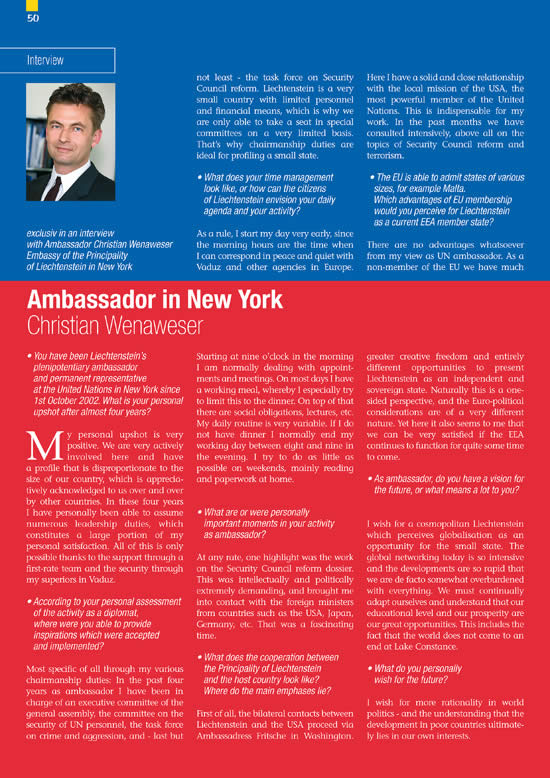 Ambassador in New York
Christian Wenaweser
Ambassador in New York
Christian Wenaweser
exclusiv in an interview
with Ambassador Christian Wenaweser
Embassy of the Principality
of Liechtenstein in New York
• You have been Liechtenstein’s
plenipotentiary ambassador
and permanent representative
at the United Nations in New York since
1st October 2002. What is your personal
upshot after almost four years?
My personal upshot is very positive. We are very actively
involved here and have a profile that is disproportionate to the size
of our country, which is apprecia-tively acknowledged to us over and
over by other countries. In these four years I have personally been
able to assume numerous leadership duties, which constitutes a
large portion of my personal satisfaction. All of this is only
possible thanks to the support through a first-rate team and the
security through my superiors in Vaduz.
• According to your personal assessment
of the activity as a diplomat,
where were you able to provide
inspirations which were accepted
and implemented?
Most specific of all through my various chairmanship duties: In the
past four years as ambassador I have been in charge of an executive
committee of the general assembly, the committee on the security of UN
personnel, the task force on crime and aggression, and - last but not
least - the task force on Security Council reform. Liechtenstein is a
very small country with limited personnel and financial means, which is
why we are only able to take a seat in special committees on a very
limited basis. That’s why chairmanship duties are ideal for profiling a
small state.
• What does your time management
look like, or how can the citizens
of Liechtenstein envision your daily
agenda and your activity?
As a rule, I start my day very early, since the morning hours are the
time when I can correspond in peace and quiet with Vaduz and other
agencies in Europe. Starting at nine o’clock in the morning I am
normally dealing with appointments and meetings. On most days I have a
working meal, whereby I especially try to limit this to the dinner. On
top of that there are social obligations, lectures, etc. My daily
routine is very variable. If I do not have dinner I normally end
my working day between eight and nine in the evening. I try to do
as little as possible on weekends, mainly reading and paperwork at home.
• What are or were personally
important moments in your activity
as ambassador?
At any rate, one highlight was the work on the Security Council reform
dossier. This was intellectually and politically extremely demanding,
and brought me into contact with the foreign ministers from countries
such as the USA, Japan, Germany, etc. That was a fascinating time.
• What does the cooperation between
the Principality of Liechtenstein
and the host country look like?
Where do the main emphases lie?
First of all, the bilateral contacts between Liechtenstein and the USA
proceed via Ambassadress Fritsche in Washington. Here I have a solid
and close relationship with the local mission of the USA, the most
powerful member of the United Nations. This is indispensable for my
work. In the past months we have consulted intensively, above all
on the topics of Security Council reform and terrorism.
• The EU is able to admit states of various
sizes, for example Malta.
Which advantages of EU membership
would you perceive for Liechtenstein
as a current EEA member state?
There are no advantages whatsoever from my view as UN ambassador. As a
non-member of the EU we have much greater creative freedom and
entirely different opportunities to present Liechtenstein as an
independent and sovereign state. Naturally this is a one-sided
perspective, and the Euro-political considerations are of a very
different nature. Yet here it also seems to me that we can be very
satisfied if the EEA
continues to function for quite some time to come.
• As ambassador, do you have a vision for
the future, or what means a lot to you?
I wish for a cosmopolitan Liechtenstein which perceives globalisation
as an opportunity for the small state. The global networking today is
so intensive and the developments are so rapid that we are de facto
somewhat overburdened with everything. We must continually adapt
ourselves and understand that our educational level and our prosperity
are our great opportunities. This includes the fact that the world does
not come to an end at Lake Constance.
• What do you personally
wish for the future?
I wish for more rationality in world politics - and the understanding
that the development in poor countries ultimately lies in our own
interests.